英语人教版八年级下册形容词和副词
八年级下册形容词副词的比较级和最高级
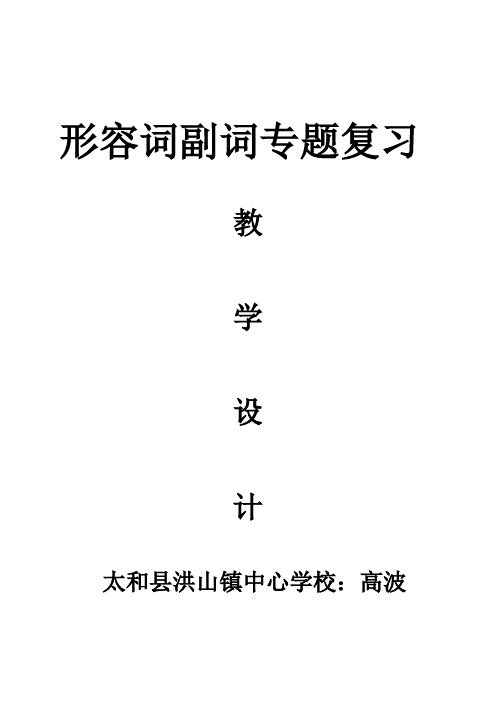
形容词副词专题复习教学设计太和县洪山镇中心学校:高波2017.5中考英语语法精讲:形容词和副词【教学目标】掌握形容词和副词的位置,基本用法和比较等级【教学内容】I. 形容词:表示人和事物的特征,对名词起修饰和描绘作用(1)形容词的位置:1.形容词在句中作定语、表语、宾语补足语等,作定语时一般放在名词前。
eg. She has short hair.(作定语)Paul is tall.(作表语)We must keep our room clean.(作宾补)2.形容词修饰不定代词时放在其后。
eg.She has something important to tell us.There’s nothing wrong in the sentence.(2)形容词作定语通常前置,但在有些情况下后置,如下表:(3)多个形容词修饰同一个名词的顺序:(4)有关形容词的重要考点:(一)形容词修饰something, anything, nothing, 或由some, any, no构成的不定代词时,把形容词后置。
1. ---Mum, Bill is coming to dinner this evening. ---OK, Let’s give him______ to eat.A. something differentB. different anythingC. anything differentD. different something2. ---Will you please tell me_____ in your city?---With pleasure. I think Wu Quan Park is worth visiting.A. interesting somewhereB. somewhere interestingC. anywhere interestingD. interesting anywhere(二)形容词作表语,放在系动词be, look, taste, smell, sound, get, become, turn, keep, seem后作表语。
新人教版|八年级下册英语所有知识点大汇总
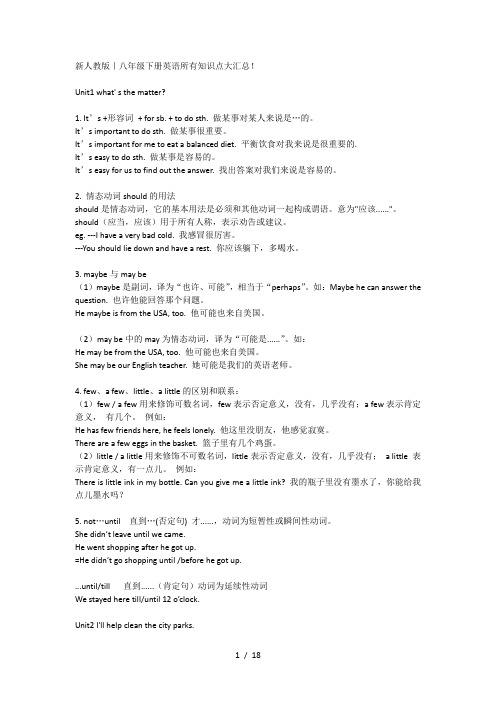
新人教版|八年级下册英语所有知识点大汇总!Unit1 what' s the matter?1. It’s +形容词+ for sb. + to do sth. 做某事对某人来说是…的。
It’s important to do sth. 做某事很重要。
It’s important for me to eat a balanced diet. 平衡饮食对我来说是很重要的.It’s easy to do sth. 做某事是容易的。
It’s easy for us to find out the answer. 找出答案对我们来说是容易的。
2. 情态动词should的用法should是情态动词,它的基本用法是必须和其他动词一起构成谓语。
意为"应该......"。
should(应当,应该)用于所有人称,表示劝告或建议。
eg. ---I have a very bad cold. 我感冒很厉害。
---You should lie down and have a rest. 你应该躺下,多喝水。
3. maybe与may be(1)maybe是副词,译为“也许、可能”,相当于“perhaps”。
如:Maybe he can answer the question. 也许他能回答那个问题。
He maybe is from the USA, too. 他可能也来自美国。
(2)may be中的may为情态动词,译为“可能是......”。
如:He may be from the USA, too. 他可能也来自美国。
She may be our English teacher. 她可能是我们的英语老师。
4. few、a few、little、a little的区别和联系:(1)few / a few用来修饰可数名词,few表示否定意义,没有,几乎没有;a few表示肯定意义,有几个。
例如:He has few friends here, he feels lonely. 他这里没朋友,他感觉寂寞。
(完整版)人教版英语八年级下册重点词组、句型及语法点汇总,推荐文档
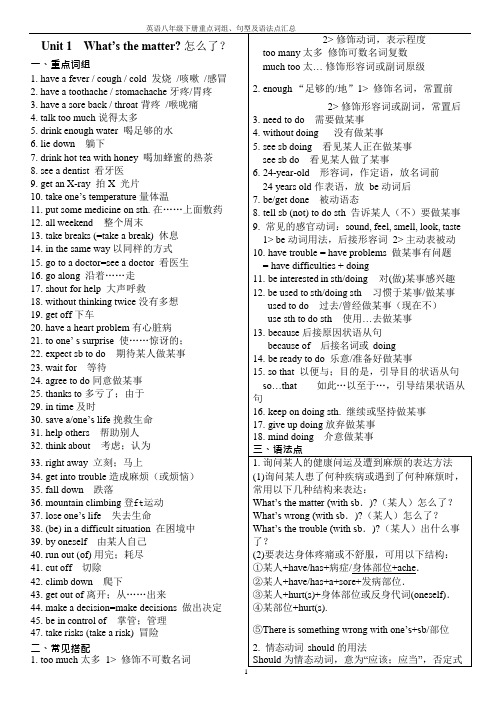
13.be back 回来14.be angry with sb 生某人的气15.throw down 扔下16.the minute=as soon as 一…就…e over 过来18.sit down 坐下19.take sb. for a walk 带某人去散步20.all the time 频繁;反复21.all day / evening 整日/夜22.shout back 大声回应23.walk away 走开24.in surprise 惊讶地25.share the housework 分担家务26.hang out 闲逛27.do chores 做杂务28.go to the store 去商店29.buy drinks and snacks 买饮料和点心30.make sb. do sth. 使某人做某事31.have enough stress from 有来自…足够的压力32.a waste of time 浪费时间33.in order to 为了34.get good grades 取得好成绩35.depend on 依赖;依靠36.have no idea 不知道37.develop children’s independence 发展孩子独立性38.look after=take care of 照顾;照看39.as a result 结果40.agree with sb 同意某人的观点/意见disagree with sb 不同意某人的观点/意见二、常见搭配1.finish doing sth. 完成做某事2.a few “几个”,后接可数名词复数few “很少,几乎没有”,后接可数名词复数a little “一点儿”,后接不可数名词little “很少,几乎没有”,后接不可数名词3.1> question “问题”,需要回答的问题,与ask或answer 搭配2> problem “问题”,需要解决的问题,与solve 搭配in the front of “在…前面”,在所说范围之内5.as…as… “与…一样…”,中间加形容词或副词原级,。
人教版八年级英语下册各知识点归纳总结(最新最全)

人教版八年级英语下册各知识点归纳总结Unti1 what’s the matter?短语归纳1.too much 太多2.lie down 躺下3.get an X-ray 做个X光检查4.take one ’s temperature 量体温5.put some medicine on ......在....上敷药6.have a fever 发烧7.take breaks /take a break 休息 8.without thinking twice 没多想9.get off 下车 10.take sb to the hospital 送某人去医院11.wait for等待 12.to one’s surprise 使.......惊讶的13.thanks to多亏于;由于 14.in time及时15.think about 考虑 16.have a heart problem患有心脏病用法归纳1.need to do sth .需要去做某事2.see sb doing sth 看见某人正在做某事3.ask sb sth 询问某人某事4.expect sb to do sth 期望某人做某事5.agree to do sth 同意做某事6.help sb (to) do sth 帮助某人做某事7.want to do sth 想要做某事 8.tell sb to do sth 告诉某人做某事9.have problems(in) doing sth 做某事有困难 e sth to do sth用某物去做某事语法点1.询问某人的健康问题及遇到麻烦的表达方法2.情态动词should的用法3.不定代词的用法精细解读1. What’s the matter (with you)? 怎么了?出什么事了?What’s the trouble/ the problem / wrong with sb./ sth.?2. I had a cold.我感冒了。
人教版丨八年级下册英语4单元知识点总结

人教版丨八年级下册英语4单元知识点总结【重点单词】allow [əˈlaʊ] v. 允许,准许wrong [rɔŋ] adj. 错误的What's wrong? 哪儿不舒服?midnight ['mɪdnaɪt] n. 午夜,子夜look through 浏览,快速查看guess [ɡes] v. 猜测,估计deal [di:l] v. 处理,应付big deal 重要的事work out 成功地发展,解决get on with 和睦相处,关系良好relation [rɪˈleɪʃn] n. 关系,联系,交往communicate [kəˈmju:nikeit] v. 沟通,通信,通讯communication [kəˌmju:nɪˈkeɪʃn] n. 交流,沟通argue [ˈɑ:ɡju:] v. 争论,争吵cloud [klaʊd] n. 云elder ['eldə(r)] adj. 年级较长的instead [ɪnˈsted] adv. 代替whatever [wɒtˈevər] pron. 任何,不管什么,无论什么nervous [ˈnə:vəs] adj. 紧张不安的offer ['a:fər] v. 提供,自愿给予proper [ˈprɔpə] adj. 合适的,适当的secondly [ˈsekəndli] adv. 第二,其次explain [ɪkˈspleɪn] v. 讲解,解释,说明clear [klɪə] adj. 清晰的,清楚易懂的copy [ˈkɔpi] v. 复制return [rɪ'tɜ:n] v. 回来,返回,归还anymore ['enɪmɔ:] adv. 不再,再也不member [ˈmembə] n. 成员,会员pressure ['preʃə(r)] n. 压力compete [kəm'pi:t] v. 比赛,竞争opinion [əˈpɪnjən] n. 意见,想法,看法skill [skɪl] n. 技能,技巧typical [ˈtɪpɪkl] adj. 典型的football [ˈfʊtbɔ:l] n. 足球cut out 删去,删除quick [kwɪk] adj. 快的,迅速的continue [kənˈtɪnju:] v. 继续,连续compare [kəm'peə] v. 比较compare…with 比较,对比crazy [ˈkreɪzɪ] adj. 疯狂的,狂热的development [diˈveləpmənt] n. 发育,成长,发展cause [kɔ:z] n. & v. 原因;造成,使发生usual [ˈju:ʒuəl] adj. 通常的,平常的in one's opinion 依…看perhaps [pəˈhæps] adv. 可能,大概,也许词形变化1.wrong →right(反义词)municate(动词) →communication(名词)3.cloud(名词) →cloudy(形容词)4.old →older/elder (比较级)5. second→secondly (副词)6.explain (动词)→explanation(名词)pete(动词) →competition (名词)8. craze(名词) →crazy (形容词)9. develop(动词) →development(名词)ual (形容词)→usually(副词)11.perhaps →maybe/probably (同义词) 【重点短语】1. have any free time to do things I like有自由时间做我喜欢做的事2. allow sb. to do sth. 允许某人做某事3. take/ have after-school classes参加课后辅导班4. hang out with sb. 与某人闲逛5. get into fight with somebody= have a fight with somebody=fight with somebody 和某人闹矛盾.6. until midnight直到半夜get on (well) with somebody和某人相处(得好)get into a good university / a good senior high school上好大学/高中7. talk to sb. 与某人交谈so that…以至于……;以便于……take him to the ball game带他去参加球类比赛8. too many books太多的书9. study too much学得过多10. get enough sleep有足够的睡眠11. write sb. a letter给某人写信12. call sb. up打电话给某人13. surprise sb. 令某人惊讶14. look through翻看;检查;浏览;find somebody doing something发现某人正在做……wait that/ so long等待如此久15. be angry with sb. 生某人的气give something back to somebody= return something to somebody归还某物给某人forget about ……忘掉……16. a big deal重要的事17. work out成功地发展;解决19. fight a lot经常吵架/打架relations between my parents父母之间的关系be nice/ friendly /kind to somebody对某人友好20. hang over笼罩21. refuse to do sth. 拒绝做某事22. offer to do sth. 主动提出做某事feel lonely and nervous感到孤独和紧张sit down and communicate with your brother坐下来和你哥哥交流24. mind sb. doing sth. 介意某人做某事borrow sth. without asking/ without returning them借某物没不说/不归还25. all the time一直26. in future今后27. make sb. angry使某人生气28. worry about sth. 担心某事29. copy one’s homework抄袭某人的作业have a pet养宠物30. be oneself做自己31. family members32. spend time alone独自消磨时光33. give sb. a lot pressure给某人很大压力34. have a fight with sb. 与某人吵架35. compete with sb. 与某人竞争36. free time activities业余活动37. get better grades取得更好的成绩38. give one’s opinion提出某人的观点39. learn exam skills学习应试技巧a typical American family典型的美国家庭comparing …with…把…和…比较be unhappy with= be angry with 对……生气40. practice sports体育训练41. cause a lot of stress导致许多压力think for somebody为某人考虑to be a successful person成为成功人士in one’s opinion 就某人看来……;依某人的观点…be right about…在某方面正确wait a few more days再等几天help each other相互帮助stress out过度紧张/劳累do activities I enjoy进行我喜欢的活动42. cut out删除【重点句型】1. I studied until mid night last night so I didn’t get enough sleep. 我昨晚学习到半夜所以睡眠不足。
最全面人教版八年级下册英语第五单元知识点归纳总结
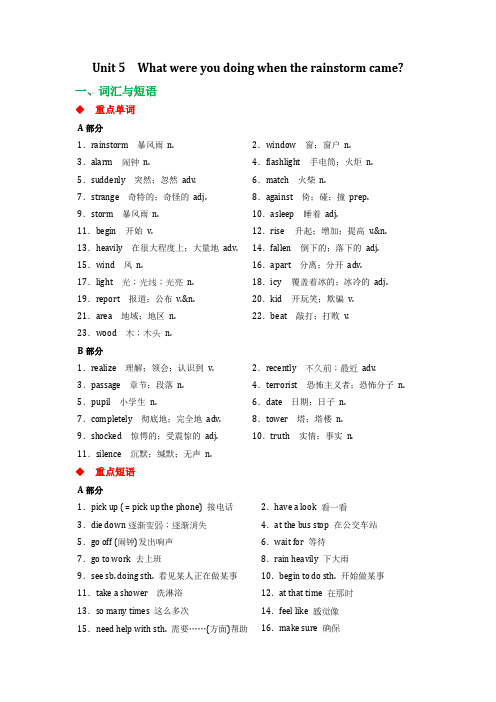
Unit 5 What were you doing when the rainstorm came?一、词汇与短语◆重点单词A部分1.rainstorm 暴风雨n.2.window 窗;窗户n.3.alarm 闹钟n.4.flashlight 手电筒;火炬n. 5.suddenly 突然;忽然adv.6.match 火柴n.7.strange 奇特的;奇怪的adj.8.against 倚;碰;撞prep. 9.storm 暴风雨n.10.asleep 睡着adj.11.begin 开始v.12.rise 升起;增加;提高v.&n. 13.heavily 在很大程度上;大量地adv.14.fallen 倒下的;落下的adj. 15.wind 风n.16.apart 分离;分开adv. 17.light 光;光线;光亮n.18.icy 覆盖着冰的;冰冷的adj. 19.report 报道;公布v.&n.20.kid 开玩笑;欺骗v.21.area 地域;地区n.22.beat 敲打;打败v.23.wood 木;木头n.B部分1.realize 理解;领会;认识到v.2.recently 不久前;最近adv. 3.passage 章节;段落n.4.terrorist 恐怖主义者;恐怖分子n. 5.pupil 小学生n.6.date 日期;日子n. 7.completely 彻底地;完全地adv.8.tower 塔;塔楼n.9.shocked 惊愕的;受震惊的adj.10.truth 实情;事实n. 11.silence 沉默;缄默;无声n.◆重点短语A部分1.pick up ( = pick up the phone) 接电话2.have a look 看一看3.die down逐渐变弱;逐渐消失4.at the bus stop 在公交车站5.go off (闹钟)发出响声6.wait for 等待7.go to work 去上班8.rain heavily 下大雨9.see sb. doing sth. 看见某人正在做某事10.begin to do sth. 开始做某事11.take a shower 洗淋浴12.at that time 在那时13.so many times 这么多次14.feel like 感觉像15.need help with sth. 需要……(方面)帮助16.make sure 确保17.with no light outside 外面没有灯光18.help sb. (to) do sth. 帮助某人做某事19.put……over……把……覆盖在……上20.make dinner 做晚饭21.put sth. on the table 把某物放在桌子上22.play a card game 玩纸牌游戏23.beat heavily against the windows 猛烈地敲打着窗户24.get to the place of the accident 到达事故发生地25.have fun 玩得愉快26.wake up 醒来;叫醒27.at first 起初;起先28.in times of difficulty 在困难时29.fall asleep 进入梦乡;睡着30.right away 立刻;马上31.go outside with sb. 和某人一起出去32.in the library 在图书馆33.find sth. in a mess 发现……一片狼藉34.on the street 在大街上35.break sth. apart 把某物折断(或分开)B部分1.in silence 沉默;无声2.in history 在历史上3.take down 拆除;往下拽;记录4.remember doing sth. 记得做过某事5.make one's way 前往;费力地前进6.look out of the window 向窗外看7.the school basketball competition 学校篮球比赛8.have meaning to sb.对某人来说有意义9.walk by 从旁边经过10.point sth. out to sb. 向某人指岀某物11.by the side of the road 在路边12.go away 离开13.at the event 在这次活动中14.as well 也15.be late for 迟到16.call out the winner 宣布获胜者17.on this day 在这一天18.10 minutes ago 十分钟前19.on April 4 在四月四日20.be completely shocked 完全震惊了21.an important event 一次重要的事件22.the rest of 其余的23.on the radio 在收音机上◆重点句子A部分1.What were people doing yesterday at the time of the rainstorm?昨天暴风雨来临时人们正在干什么?2.when the rain storm suddenly came, what were you doing?当暴风雨突然来临时,你正在做什么?3.So while you were sleeping, I called Jenny and she helped me.因此在你睡觉的时候,我打电话给珍妮,她帮了我。
人教版英语八年级下册Unit2 (易混辨析):alone与lonely的区别

【易混辨析】:alone与lonely的区别一、alone既可用作形容词,又可用作副词,意为“独自的(地)、单独的(地)”,侧重于说明独自一人,没有同伴或助手,指的是客观情况。
1. alone用作形容词时,一般与be动词连用,在句中作表语。
例如:She is alone at home. (她独自一人在家。
)He is not alone in this idea.(有这种想法的不只是他一个人。
)2. alone用作副词修饰动词时,应该放在动词后面作状语。
例如:I like to work alone. (我喜欢独自一人工作。
)Han Mei was reading alone when the teacher came into the classroom.(老师走进教室时,韩梅正独自一人在看书。
)3. alone用作副词时,也可作定语,意为“只有,仅仅”,但必须置于它所修饰的名词或代词之后。
例如:He alone was in the secret. (只有他一人知道内情。
)This year alone, we’ve already planted ten thousand trees. (仅是今年,我们已经栽了一万棵树。
)4. alone在句中的位置不同,句子的意思也不同。
例如:She alone went to college last year.(去年只有她一人考上大学了。
)(别人没有考上大学)She went to college alone last year.(去年她独自一人上大学去了。
)(没有别人送她去,她自己一个人去的)二、lonely只用作形容词,它在句中既可作定语,也可作表语,表示“孤独的,寂寞的”意思。
该词带有浓厚的感情色彩,具有“渴望得到同伴”的含义,其比较级形式为lonelier。
1. lonely用作定语时,意为“孤单的,无伴侣的,无人烟的,荒凉的,偏僻的”等。
八年级英语形容词和副词的比较级和最高级

形容词,副词的比较级、最高级一、规则变化1.一般在词尾直接加er或est,例如,tall-taller-tallest,long-longer-longest2.以不发音的字母e结尾的单词在词尾直接加r或st,例如,nice-nicer-nicest3.以辅音字母+y结尾的词,把y变为i,再加er或est,例如,heavy-heavier-heaviest4.重读闭音节,末尾只有一个辅音字母,双写这个辅音字母,再加er或est,例如,big-bigger-biggest5.部分双音节词和多音节词分别在原级前加more构成比较级和most构成最高级,例如,slowly-more slowly-most slowly;beautiful-more beautiful-most beautiful等级的用法一、原级常用的句型结构形容词的比较级用于对人或事物的比较时,若双方均等时,要用原级,用:A:“主语+be+as+形容词原级+as+其它”表示“甲和乙程度相同”或“甲是乙的几倍”如:Tom is as old as Kate.汤姆和凯特年龄一样大。
John runs as fast as Mike.汤姆和迈克跑得一样快。
B:(1)句型的否定式:“主语+be+not+as/so+形容词原级+as+其它”表示“甲不如乙…”如:This room is not as/so big as that one. 这个房间不如那个大。
He doesn’t walk as slowly as you.他走路不像你那样慢。
二、比较级的用法1.可以修饰比较级的词,much,a lot,far,a little,a bit,even,still如:Lesson One is much easier than Lesson Two.第一课比第二课容易得多。
This train runs a litter faster than that one.这辆火车比那辆跑地快。
形容词、副词的原级和比较级(八年级英语)
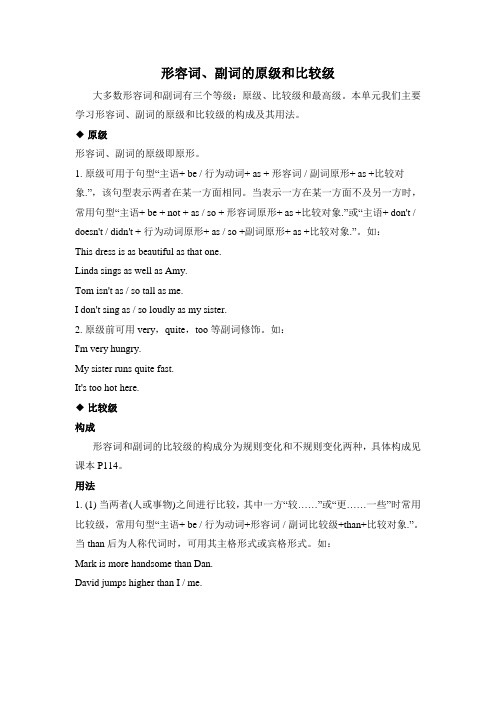
形容词、副词的原级和比较级大多数形容词和副词有三个等级:原级、比较级和最高级。
本单元我们主要学习形容词、副词的原级和比较级的构成及其用法。
◆原级形容词、副词的原级即原形。
1. 原级可用于句型“主语+ be / 行为动词+ as + 形容词 / 副词原形+ as +比较对象.”,该句型表示两者在某一方面相同。
当表示一方在某一方面不及另一方时,常用句型“主语+ be + not + as / so + 形容词原形+ as +比较对象.”或“主语+ don't / doesn't / didn't + 行为动词原形+ as / so +副词原形+ as +比较对象.”。
如:This dress is as beautiful as that one.Linda sings as well as Amy.Tom isn't as / so tall as me.I don't sing as / so loudly as my sister.2. 原级前可用very,quite,too等副词修饰。
如:I'm very hungry.My sister runs quite fast.It's too hot here.◆比较级构成形容词和副词的比较级的构成分为规则变化和不规则变化两种,具体构成见课本P114。
用法1. (1) 当两者(人或事物)之间进行比较,其中一方“较……”或“更……一些”时常用比较级,常用句型“主语+ be / 行为动词+形容词 / 副词比较级+than+比较对象.”。
当than后为人称代词时,可用其主格形式或宾格形式。
如:Mark is more handsome than Dan.David jumps higher than I / me.(2) 当询问两者中“谁更 / 哪一个更 / 什么更……”时,常用句型“Who / Which / What+ be + 形容词比较级, A or B?”或“Who / Which / What +行为动词 + 副词比较级, A or B?”。
人教英语八年级下册Unit7 形容词、副词 (共19张PPT)

te--10.fat--12.important14.many--16.bad--18.beautiful---
考点三、形容词、副词比较级和 最高级的基本句型及基本用法
1 as + 原级 + as… 和…一样 如:Tom is as careful as Linda.
• 新的new 旧的old 老的 young年轻的
• 容易的easy 难的hard 硬的 soft软的
• 健康的well 病了ill 坏了 good好了
• 错的wrong 对的right 右边的 left左边的
• 长的long 短的short 矮的 tall高的
• 胖的fat 瘦的thin 薄的
thick厚的
• 反义词归类。 • bad—good,big—small,large—small,black—white, • busy—free,cold—hot,cool—warm,dead—alive, • dry—wet,empty—full,fast—slow,high—low, • ill—well,little—much,open—closed,same—different, • safe—dangerous,southern—northern,less—more, • least—most,worse—better,worst—best,cheap—dear/ • expensive,easy—hard/difficult,possible—impossible, • happy—unhappy/sad,early—late
many\much more
most
little
less
least
far
farther\ farthest\
最全面人教版八年级下册英语第四单元知识点归纳总结
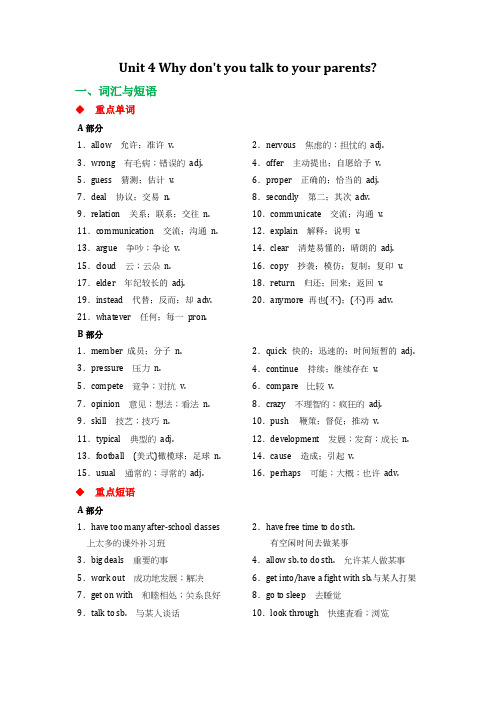
Unit 4 Why don't you talk to your parents?一、词汇与短语◆重点单词A部分1.allow 允许;准许v.2.nervous 焦虑的;担忧的adj. 3.wrong 有毛病;错误的adj.4.offer 主动提出;自愿给予v. 5.guess 猜测;估计v.6.proper 正确的;恰当的adj. 7.deal 协议;交易n.8.secondly 第二;其次adv. 9.relation 关系;联系;交往n.10.communicate 交流;沟通v. 11.communication 交流;沟通n.12.explain 解释;说明v.13.argue 争吵;争论v.14.clear 清楚易懂的;晴朗的adj. 15.cloud 云;云朵n.16.copy 抄袭;模仿;复制;复印v. 17.elder 年纪较长的adj.18.return 归还;回来;返回v. 19.instead 代替;反而;却adv.20.anymore 再也(不);(不)再adv. 21.whatever 任何;每一pron.B部分1.member 成员;分子n.2.quick 快的;迅速的;时间短暂的adj. 3.pressure 压力n.4.continue 持续;继续存在v. 5.compete 竞争;对抗v.6.compare 比较v.7.opinion 意见;想法;看法n.8.crazy 不理智的;疯狂的adj. 9.skill 技艺;技巧n.10.push 鞭策;督促;推动v. 11.typical 典型的adj.12.development 发展;发育;成长n. 13.football (美式)橄榄球;足球n.14.cause 造成;引起v.15.usual 通常的;寻常的adj.16.perhaps 可能;大概;也许adv.◆重点短语A部分1.have too many after-school classes 上太多的课外补习班2.have free time to do sth.有空闲时间去做某事3.big deals 重要的事4.allow sb. to do sth. 允许某人做某事5.work out 成功地发展;解决6.get into/have a fight with sb.与某人打架7.get on with 和睦相处;关系良好8.go to sleep 去睡觉9.talk to sb. 与某人谈话10.look through 快速査看;浏览11.get enough sleep 得到充足的睡眠12.call sb. up 给某人打电话13.on the phone 在电话中14.so that 以便;为了15.give sth. back to sb. 把某物归还给某人16.forget about sth. 忘记关于某事17.hang over 笼罩在……18.be nice to sb. 对某人友好19.until late at night 直到深夜20.refuse to do sth. 拒绝做某事21.let sb. do sth. 让某人做某事22.talk about sth. with sb.与某人谈论某事23.offer to do sth. 主动提出做某事24.be afraid of doing sth. 害怕做某事25.communicate with sb. 与某人交流B部分1.in one's opinion 依……看2.spend time alone 独自消磨时光3.a lot of pressure 许多压力4.not……until……直到……才……5.free time activities 业余活动6.have a quick dinner 很快吃完晚饭7.the common problem 普遍问题8.compare…with…把…和…作比较,对比9.cut out 删除;删去10.know about 了解11.be important for sth. 对……重要12.keep on doing sth. 一直做某事13.send sb. to……派某人去……14.worry about 担心15.give one's opinion about sth.就某事给出某人的观点16.differences and similarities 不同点和相似点17.too much pressure 太多的压力18.compete with sb. 与某人竞争19.think for oneself 为某人自己着想20.push sb. so hard 逼迫某人太紧21.cause a lot of stress for sb. 给某人造成很多压力◆重点句子A部分1.Why don't you go to sleep earlier this evening? 为什么你今晚不早点儿去睡觉呢?2.What's wrong with you? 你哪儿不舒服?3.Although she's wrong, it's not a big deal. 尽管她做得不对,但也没什么大不了的。
人教版丨八年级英语下册unit 7 形容词和副词的比较级和最高级
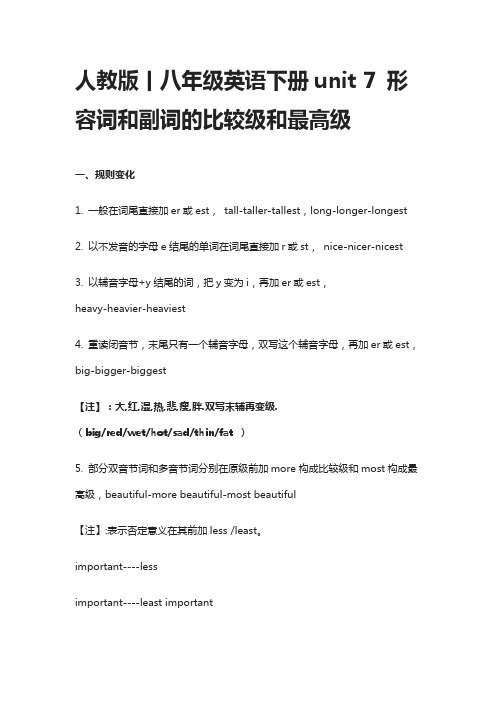
人教版丨八年级英语下册unit 7 形容词和副词的比较级和最高级一、规则变化1. 一般在词尾直接加er或est,tall-taller-tallest,long-longer-longest2. 以不发音的字母e结尾的单词在词尾直接加r或st,nice-nicer-nicest3. 以辅音字母+y结尾的词,把y变为i,再加er或est,heavy-heavier-heaviest4. 重读闭音节,末尾只有一个辅音字母,双写这个辅音字母,再加er或est,big-bigger-biggest【注】:大,红,湿,热,悲,瘦,胖.双写末辅再变级.(big/red/wet/hot/sad/thin/fat )5. 部分双音节词和多音节词分别在原级前加more构成比较级和most构成最高级,beautiful-more beautiful-most beautiful【注】:表示否定意义在其前加less /least。
important----lessimportant----least importantEnglish is more interesting than Chinese =Chinese is less interesting than English .6.由“形容词+ly”构成的副词,在其前加more/ most。
slowly---moreslowly----most slowly;但early—earlier---earliest二、不规则变化原级→比较级→最高级good/well→better→bestmany/much→more→mostlittle→less→leastold→older / elder→oldest /eldestbad/badly/ill→worse→worstfar→farther (距离)/further(程度)→farthest /furthest下列单、双音节词只能加more和most注: 形容词,副词同形有: back , high , well ,fast, early, late ,straight三、常见用法(一)原级句型:1. A is as+原级+ as+ B 表示A 与B一样…eg:He is as tall as me.2. A is not as/so +原级+ as B表示A不如B…He is not as tall as me.3. 只能修饰原级的词,very,quite,so,too,so,enough, pretty等,例如,He is too tired to walk on.他太累了以至于不能再继续走了。
八年级英语语法之形容词、副词、连词、非谓语动词

一、形容词和副词概述:形容词是指那些用来描述或修饰名词(或代词)的一类词。
一般放在其所修饰的名词之前。
在句中用作定语、表语、补语、状语等。
多数形容词具有比较等级。
副词是用以修饰动词、形容词、句子以及其他副词的词。
在形式上,许多副词带有后缀ly。
形容词、副词是中学英语重要语法项目,也是中考重要考查内容。
中考考点1.形容词和副词的原级、比较级和最高级的构成规则、基本句型及其用法。
2.形容词作表语和定语的用法。
3.副词作状语的用法。
考点一形容词1.形容词的一般用法1)形容词作表语,表明主语的性质和特征,放在连系动词之后。
如:Computers are very useful in our everyday life.Leaves turn yellow in autumn.2)形容词作定语,修饰名词或不定代词,通常放在名词之前,不定代词之后。
如:This is an unhealthy diet.There is nothing important in today’s newspaper.[注意] 由连字符连接起来的复合形容词中的名词只能用单数形式。
如:an eight-year-old boy 一个8岁的男孩3)形容词作宾语补足语,放在宾语之后,与其构成复合宾语。
如:You should keep your classroom clean and tidy.I found it difficult to get on well with the manager。
(4)数词+形容词,表示长、宽、高、深以及年龄。
如:five thousand kilometers long五千多千米长(5)the+形容词,表示一类人或物。
如:the old 老人(6)表语形容词。
这些形容词只能位于系动词后面作表语。
如:alone, awake, alive, well(健康的), ill, frightened等。
如:The boy is alone.(正)The alone boy is here.(误)(7)只能作定语的形容词。
英语人教版八年级下册形容词、副词的比较等级

比较等级的常见句型:
1. as+原级+as “与……一样”; (not) as\so+原级+as “不如……” 2. 比较级+and+比较级 “越来越 ……”; 3. the+比较级, the+比较级 “越……,就越……”; 4. one of+the最高级 +复数名词 “最……之一” 5. the+序数词+最高级 “第……的”
选出最佳答案。 C 1. _____ I read, _____ I’ll be. A.The more, the happier B. More, happy C.The most, the happiest 2. Harry Potter is one of _____ movies I like C best. A. long B. longer C. the longest 将下列句子译成英语。 3. 中国是世界上第三大国。
2.掌握比较等级的常考句型,并能在 中考题型中灵活运用。
1.什么是形容词?什么是副词? 人或事物 的 形容词用于修饰___ 名 词,表示__________ heavy box一个重盒子 特征, eg. a ______ 动词 、 形容词 副词用于修饰______ ______或其他副词, hard 努力学习 eg. study _____
A. tall
B. taller
C. the tallest
3. With the development of the society, there
B will be _______ living space for wild
animals.
A. fewer and fewer B. less and less
China is the third largest country in t 造原级、比较级和最高级的 句子。 2. 完成练习P76。
人教版八年级英语形容词副词比较级知识要点讲解
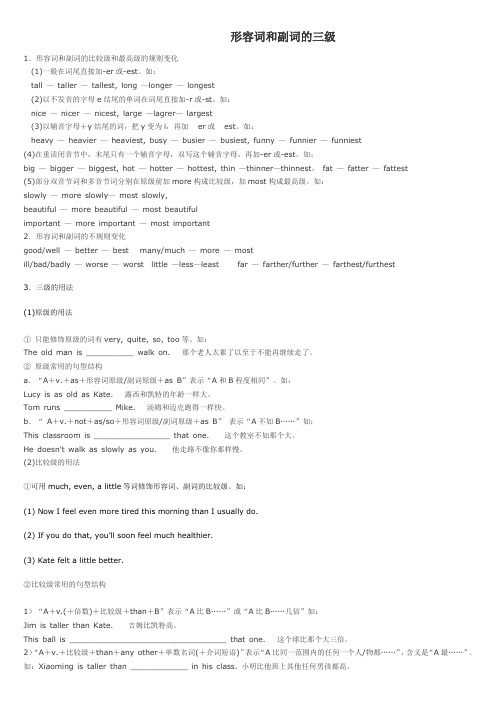
形容词和副词的三级1.形容词和副词的比较级和最高级的规则变化(1)一般在词尾直接加-er或-est。
如:tall —taller —tallest, long —longer —longest(2)以不发音的字母e结尾的单词在词尾直接加-r或-st。
如:nice —nicer —nicest, large —lagrer—largest(3)以辅音字母+y结尾的词,把y变为i,再加er或est。
如:heavy —heavier —heaviest, busy —busier —busiest, funny —funnier —funniest(4)在重读闭音节中,末尾只有一个辅音字母,双写这个辅音字母,再加-er或-est。
如:big —bigger —biggest, hot —hotter —hottest, thin —thinner—thinnest,fat —fatter —fattest(5)部分双音节词和多音节词分别在原级前加more构成比较级,加most构成最高级。
如:slowly —more slowly—most slowly,beautiful —more beautiful —most beautifulimportant —more important —most important2.形容词和副词的不规则变化good/well —better —best many/much —more —mostill/bad/badly —worse —worst little —less—least far —farther/further —farthest/furthest3.三级的用法(1)原级的用法①只能修饰原级的词有very, quite, so, too等。
如:The old man is __________ walk on. 那个老人太累了以至于不能再继续走了。
②原级常用的句型结构a.“A+v.+as+形容词原级/副词原级+as B”表示“A和B程度相同”。
人教版初中英语八年级下册语法知识点
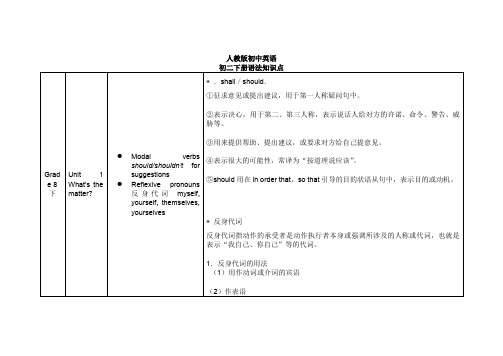
4.动词+副词+介词(其后需加宾语)
5.动词+名词(其后不加宾语)
make a bed整理床铺take place发生make faces做鬼脸
6.动词+名词+介词(其后需加宾语)
It is very kind of you to help me.=You are very kind to help me.你帮我的忙,太谢谢你了。
5.疑问词和不定式连用和疑问词连用的不定式在句中相当于名词,常作主语、宾语、表语、同位语等。
6.省略to的不定式
(1)当两个(或两个以上的)不定式由and,or,than等连接时,通常只需在第一个不定式前用to,其余不定式前的to可省略。
4)当某些结构后的不定式动作与句中某一动作重复时,不定式符号to之后的其他成分可以省略,只保留不定式符号to。常见结构有:be able to,be going to,have to,ought to,used to等。
8.不定式的主动表示被动
①在“be+性质形容词+不定式”结构中。
此类形容词有easy,hard,difficult,interesting,heavy,pleasant,comfortable,safe,dangerous,impossible等。
4.不定式的复合结构不定式用for和of引出逻辑主语,带有逻辑主语的不定式称为不定式的复合结构。不定式的复合结构在句中可作主语、宾语、定语等。
当作表语的形容词表示人的性格、品质时,常用of引出不定式的逻辑主语,否则用for引出。常见的表示性格、品质的形容词有:
good好的kind和蔼的brave勇敢的honest诚实的lazy懒惰的nice好的wise明智的clever聪明的silly傻的stupid笨的foolish愚蠢的right正确的wrong错的rude粗鲁的polite礼貌的fair公正的unfair不公正的careless粗心的careful细心的patient耐心的
- 1、下载文档前请自行甄别文档内容的完整性,平台不提供额外的编辑、内容补充、找答案等附加服务。
- 2、"仅部分预览"的文档,不可在线预览部分如存在完整性等问题,可反馈申请退款(可完整预览的文档不适用该条件!)。
- 3、如文档侵犯您的权益,请联系客服反馈,我们会尽快为您处理(人工客服工作时间:9:00-18:30)。
Unit 7 What’s the highest mountain in the world?
Period 3 Section A Grammar Focus Knowledge aims:
1. Words and phrases: ocean, the Pacific Ocean
2. Summarize the grammar and practice them.
Ability aims:
1. Grasp the use of the comparative and superlative.
2. Enable the students to do things using the target language and the grammar.
Emotional aims: Practice makes perfect.
Teaching important points:
1. The comparative and superlative of the adj.
2. Master the grammar focus.
Teaching difficult points: Learn to describe the tops using the comparative and superlative of the adj.
Teaching aids: PPT, a recorder
Teaching procedures:
Step 1 Revision
Ask Ss to retell the story in 3a.
Step 2 Grammar focus
1. Get the students to read through the sentences in Grammar focus.
2. Students read and rewrite the comparative and superlative of the adj.
Step 3 Work on 4a
1. Get Ss to fill in the blanks with the correct forms of the words in the box.
2. Check the answers.
Step 4 Work on 4b
1. Get the students to write two comparisons about two topics.
e.g. Two rivers: the Yangtze River and the Amazon River
The Yangtze River is almost as long as the Amazon River.
The Amazon is longer than the Yangtze, but the Yangtze River is the longest river in China.
2. Students write and read their sentences.
Step 5 Activity 4c
1. Get the students to write five questions using comparisons.
2. Students ask and answer their questions in groups.
Step 6 Homework
1. Finish off the exercise for this period.
2. Write more sentences using comparisons
The blackboard design:
Unit 7 What’s the highest mountain in the world?
Period 3 Section A Grammar Focus
ocean the Pacific Ocean
The Yangtze River is almost as long as the Amazon River.
The Amazon is longer than the Yangtze, but the Yangtze River is the longest river in China.。
